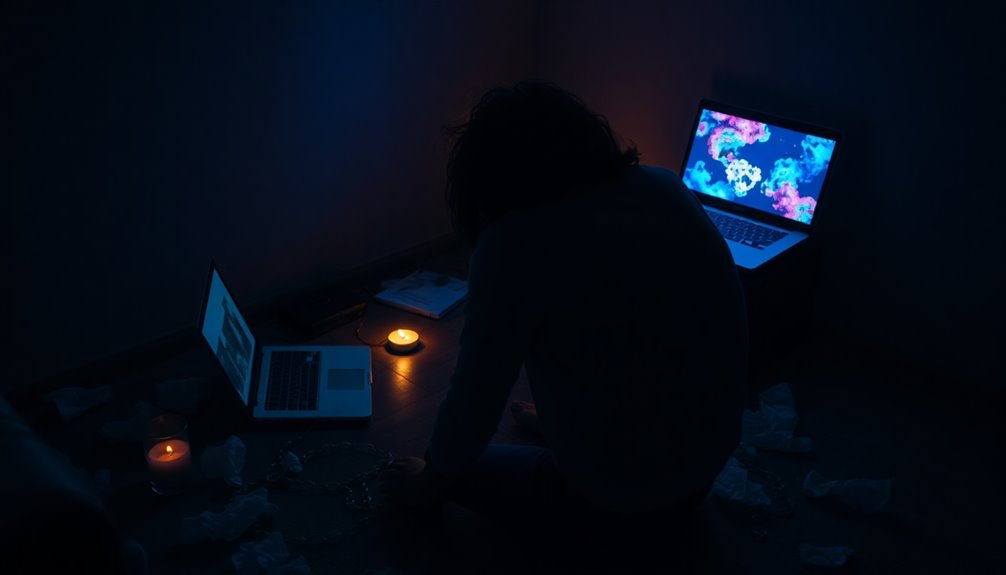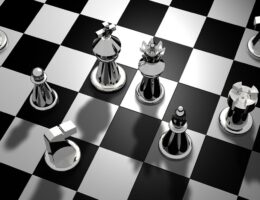You might struggle to quit porn because it often feels like an escape from stress or loneliness. Emotional triggers, like anxiety or relationship issues, can draw you back into old habits. The temporary pleasure it provides creates a cycle of shame that reinforces these behaviors. Your environment also plays a role; specific cues can ignite cravings. To find freedom, it's essential to recognize these patterns and develop healthier coping strategies. By cultivating mindfulness and seeking support, you can take meaningful steps towards recovery. If you want to explore this journey further, there are more insights waiting for you.
Understanding Pornography Addiction
While you might think of pornography as a harmless escape, for many, it can become an addictive behavior that shapes daily life.
Understanding this addiction starts with recognizing your own behavioral patterns. You might find yourself turning to porn during stress or boredom, creating a cycle that's hard to break. Constant worry can exacerbate the tendency to seek out pornography as a coping mechanism. Engaging in healthy habits can help break this cycle and promote overall well-being.
Self-awareness techniques can help you identify triggers and the situations that lead you to seek out pornography. Keeping a journal or practicing mindfulness can reveal underlying emotions and habits. Additionally, focusing on self-care and well-being can provide healthier coping mechanisms that reduce reliance on pornography.
The Role of Psychological Triggers
Psychological triggers play a significant role in your struggle to quit porn.
Emotional states and your surroundings can heavily influence your behavior, making it essential to recognize these patterns. Understanding universal struggles can help you develop empathy for yourself as you navigate your journey towards freedom. Engaging in healthy lifestyle choices such as regular exercise can also help mitigate the impact of these triggers. Additionally, practicing mindfulness techniques can enhance your ability to cope with these emotional challenges effectively.
Emotional Triggers Explained
What drives you to seek out porn even when you know it's not good for you? Often, it's emotional triggers that pull you in. Understanding these triggers is essential for your journey to freedom.
Emotional awareness helps you recognize how feelings like loneliness, stress, or boredom can lead to cravings. Trigger identification allows you to pinpoint specific emotions tied to your desire for porn, making it easier to address the root cause.
Instead of reacting impulsively, you can learn healthier coping mechanisms. By acknowledging your emotional state, you empower yourself to break the cycle, reclaiming control over your choices.
Environmental Influences Impacting Behavior
Your surroundings play a significant role in shaping your behaviors and choices. Environmental cues can trigger specific behavioral patterns that lead you back to porn.
For instance, if you often watch porn in a particular room or after certain activities, those settings reinforce your habits. Over time, your brain associates these cues with the urge to indulge, making it harder to resist.
Identifying these triggers is essential for breaking the cycle. Consider how aspects like lighting, noise, or even the time of day influence your cravings.
Coping Mechanisms to Develop
While environmental cues can trigger the urge to watch porn, psychological triggers often run deeper, influencing your emotions and thoughts.
To combat these triggers, consider adopting mindful breathing and meditation techniques to ground yourself in the moment. Journaling practices can help you reflect on your feelings, while positive affirmations boost your self-esteem.
Engaging in healthy hobbies and creative outlets can redirect your energy and focus. Establishing exercise routines not only improves your mood but also promotes overall well-being.
Joining support groups connects you with others facing similar challenges. Finally, implementing a digital detox can reduce temptations.
Remember to practice self-compassion strategies; it's crucial to be kind to yourself during this journey toward freedom.
Social Influences on Porn Use
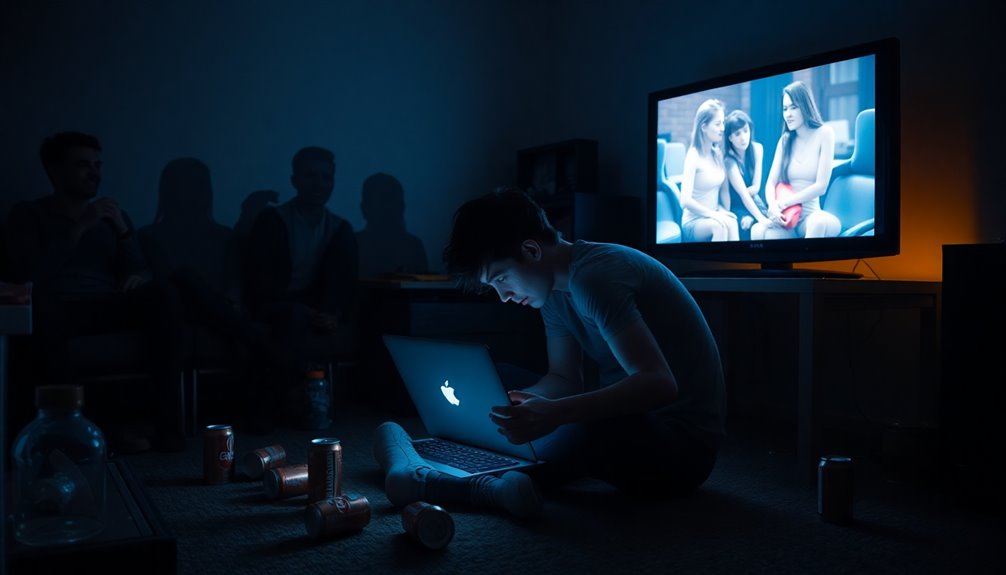
How do social influences shape our relationship with porn?
Peer pressure often pushes you to conform to cultural norms around porn use, especially when it's glorified on social media. You might find that your friendship influences your habits; if your peers consume porn regularly, you may feel compelled to do the same. True friends can provide unwavering support during life's challenges, helping you navigate the complex emotions surrounding your choices. Additionally, the presence of toxic relationships in your life can exacerbate feelings of guilt and shame regarding your porn use, leading to a cycle of unhealthy habits.
Relationship dynamics also play a role; partners may have differing views on porn, affecting how you engage with it. Stigmatization factors can further complicate things, making you feel ashamed or guilty for your choices. Societal expectations and community standards create pressures that can lead to unhealthy habits. Recognizing the importance of positive interactions in your social circle is essential for understanding these influences and finding freedom from the cycle of porn use.
Environmental Factors at Play
Environmental factors greatly shape your relationship with porn, as access and availability create a landscape where consumption becomes almost effortless.
You might notice how environmental cues, like your phone or computer, can trigger cravings. If you're in a familiar social setting, surrounded by friends or engaging in casual conversations, it can also lead to increased temptation. Engaging in positive interactions can help mitigate the impact of these cues. Digital distractions can exacerbate these triggers, making it even harder to resist.
These environments can normalize porn use, making it feel acceptable or even expected. When you encounter these cues, it becomes harder to resist the urge.
Recognizing these triggers in your surroundings allows you to take proactive steps, such as changing your environment or limiting exposure. Additionally, focusing on eliminating distractions can significantly enhance your ability to resist temptations and maintain control.
The Impact of Stress and Anxiety
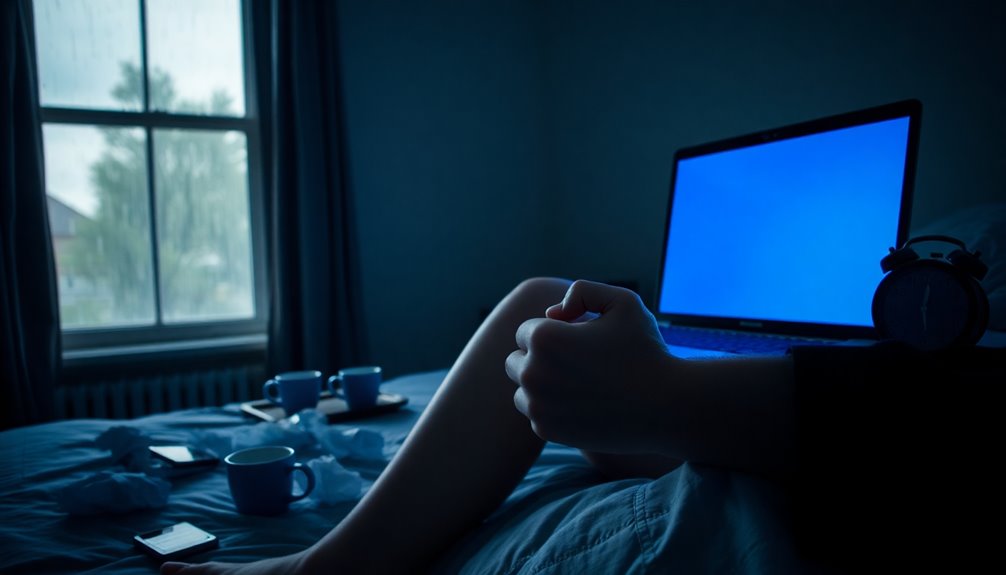
Stress and anxiety can greatly influence your desire to turn to porn as a coping mechanism. When life gets overwhelming, it's easy to seek temporary relief through familiar habits. Engaging in yoga and mindfulness practices can help you reconnect with your body and mind, providing a healthier outlet for stress. Recognizing that negative thoughts can dominate your mindset if focused on too long is essential for breaking free from these cycles.
However, relying on porn doesn't address the root causes of your stress. Instead, it can lead to a cycle of guilt and shame, further exacerbating anxiety. To break this cycle, focus on effective stress management techniques. Engage in physical activities, practice mindfulness, or explore hobbies that bring you joy. Incorporating mindfulness practices can also provide clarity and peace during challenging moments.
These alternatives can aid in anxiety reduction, allowing you to cope with stress in healthier ways. By recognizing the impact stress has on your habits, you can take proactive steps towards finding freedom and reclaiming control over your life.
Escapism: A Common Motivation
When life's pressures become overwhelming, many find themselves turning to porn as a form of escapism. This coping mechanism offers temporary relief from stress, but it's crucial to recognize both the escapism benefits and the escapism consequences.
While it might provide a brief distraction, it can lead to deeper issues.
- Momentary pleasure: A quick source of enjoyment.
- Avoidance of reality: A way to escape life's challenges.
- Emotional numbness: Detachment from feelings.
- Reinforcement of habits: Difficulty breaking the cycle.
- Impact on relationships: Strain on personal connections.
Understanding these aspects can help you reflect on your habits and explore healthier coping strategies to deal with stress and anxiety.
Neurochemical Responses to Porn
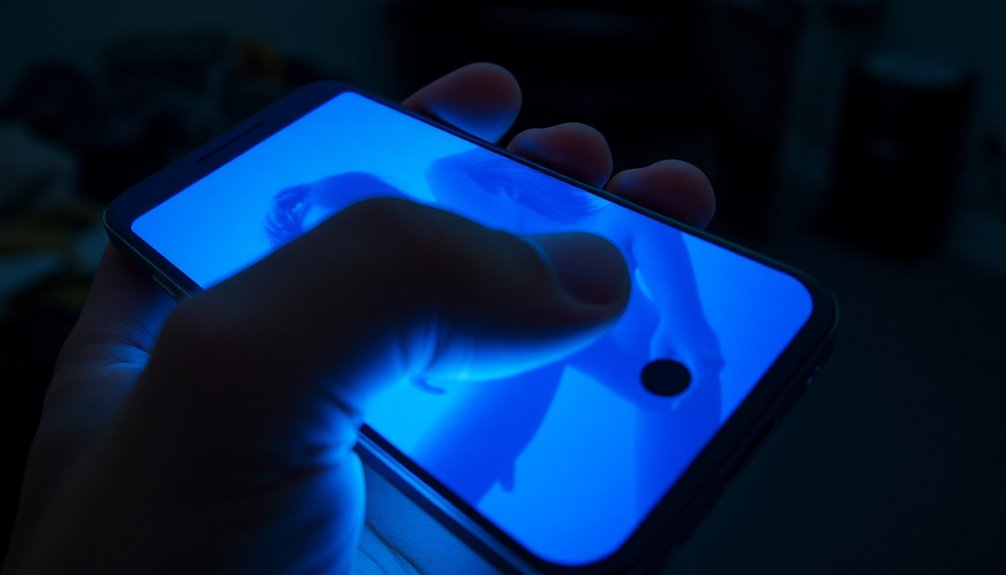
When you watch porn, your brain undergoes significant chemical changes.
This release of dopamine creates a cycle that can lead to addictive behaviors, making it hard to break free.
Understanding these addiction pathways is vital for grasping why quitting feels so challenging.
Brain Chemistry Changes
As you engage with porn, your brain undergoes significant chemical changes that can make quitting feel nearly impossible. The repeated exposure disrupts your neurochemical balance, leading to a neurotransmitter imbalance that affects your mood and motivation.
This shift heightens your reward sensitivity, making it tougher to find satisfaction in everyday activities.
Here are some key effects of these brain chemistry changes:
- Increased cravings for porn
- Reduced pleasure from non-sexual activities
- Heightened anxiety and stress levels
- Difficulty concentrating and focusing
- Altered emotional responses
Understanding these changes can help you recognize the underlying issues contributing to your struggle. By addressing the neurochemical responses, you can begin to reclaim your mental and emotional well-being.
Dopamine Release Cycle
The dopamine release cycle plays a pivotal role in your relationship with porn. Each time you view porn, your brain floods with dopamine, creating feelings of pleasure and reward. This process reinforces the behavior, making you seek it out again and again.
Over time, repeated exposure can diminish your dopamine sensitivity, meaning you need more intense stimuli to achieve the same high. This leads to a cycle of escalating consumption and increased reward anticipation. You start chasing the initial thrill, but it becomes harder to attain.
Understanding this cycle helps you recognize how your brain's chemistry influences your habits, paving the way for healthier choices. Breaking free from this cycle can lead to regaining control and finding more fulfilling sources of pleasure.
Addiction Pathways Explained
Understanding how addiction pathways work can shed light on your neurochemical responses to porn. When you engage with porn, your brain activates specific neural circuits that release dopamine, reinforcing the behavior. This cycle can create a dependency, making it tough to quit.
Here's how these addiction pathways manifest:
- Dopamine spikes lead to momentary pleasure.
- Reinforced behavior strengthens neural pathways.
- Desensitization occurs over time, requiring more intense stimuli.
- Cravings develop as your brain seeks that dopamine rush.
- Withdrawal symptoms may arise when you try to stop.
Recognizing these triggers and understanding your brain's wiring can empower you to seek healthier alternatives and break free from the grip of porn addiction.
The Cycle of Shame and Guilt
While you might initially find relief in watching porn, it often leads to a damaging cycle of shame and guilt that can be hard to escape. After indulging, you might feel good temporarily, but soon the guilt sets in.
This guilt cycle can trigger deep feelings of shame, prompting you to seek comfort in porn again. You enter a shame spiral, where each viewing reinforces negative self-perceptions.
This cycle makes it difficult to break free, as you constantly chase that fleeting relief, only to feel worse afterward. Recognizing this pattern is essential.
Understanding how the shame and guilt intertwine can empower you to take the first steps toward breaking this unhealthy cycle and finding a healthier path.
Coping Mechanisms and Their Consequences
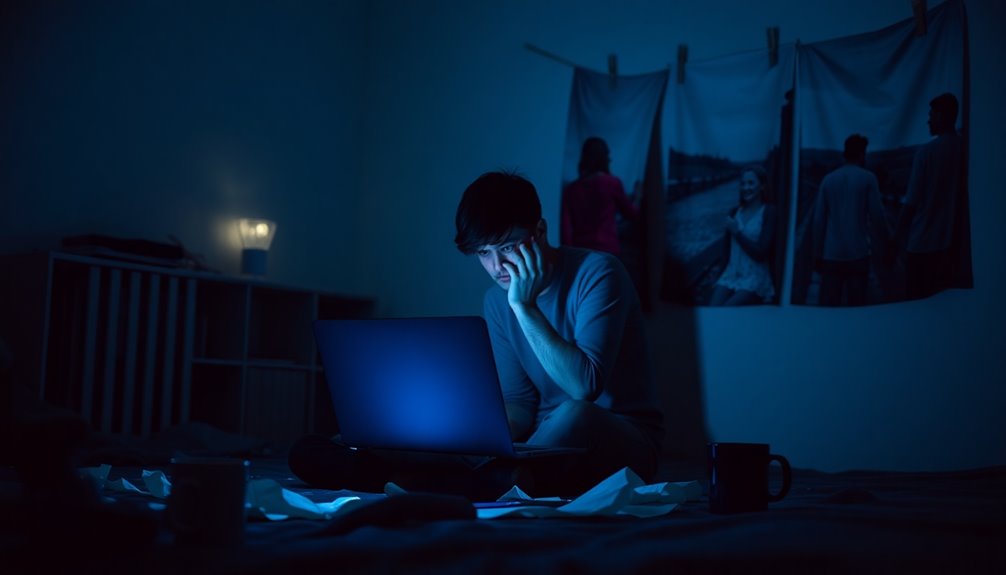
When you struggle with quitting porn, you often turn to coping mechanisms that seem to provide relief.
However, these choices can trigger emotional responses and lead to health consequences that you mightn't fully realize.
Let's explore how these patterns affect your life and well-being.
Emotional Triggers Uncovered
Although emotional triggers can often feel overwhelming, recognizing them is the first step toward managing your urges.
By focusing on trigger identification, you can build emotional resilience and reduce the likelihood of giving in. Start by acknowledging the situations or feelings that lead you to seek out porn.
Consider these common triggers:
- Stress from work or personal life
- Feelings of loneliness or boredom
- Relationship conflicts or dissatisfaction
- Low self-esteem or body image issues
- Past trauma or unresolved emotions
Health Impact Analysis
Coping with the urge to watch porn can lead to a range of health impacts, both positive and negative.
While some recovery strategies, like mindfulness practices and self-reflection techniques, can enhance mental wellness, neglecting these may expose you to health risks. You might notice addiction signs manifesting through physical consequences, such as fatigue or anxiety, affecting your daily life.
Implementing lifestyle changes and building strong support systems is essential for emotional healing. By prioritizing healthy coping mechanisms, you can mitigate the negative effects while fostering resilience.
Engaging in activities that promote well-being won't only help you combat urges but also nurture your overall health, paving the way for a more fulfilling life beyond porn.
Building Awareness of Triggers
How can you effectively recognize the triggers that lead you back to porn? Building awareness is key. By using self-awareness techniques, you can enhance your trigger identification skills.
Start by reflecting on situations that lead to cravings. Pay attention to your emotional state and surroundings. Here are some tips to help you:
- Keep a journal to note your thoughts and feelings.
- Identify specific locations or times when cravings are strongest.
- Recognize emotional triggers like stress, boredom, or loneliness.
- Observe patterns in your behavior leading up to the urge.
- Discuss your experiences with a trusted friend or support group.
Strategies for Breaking Free
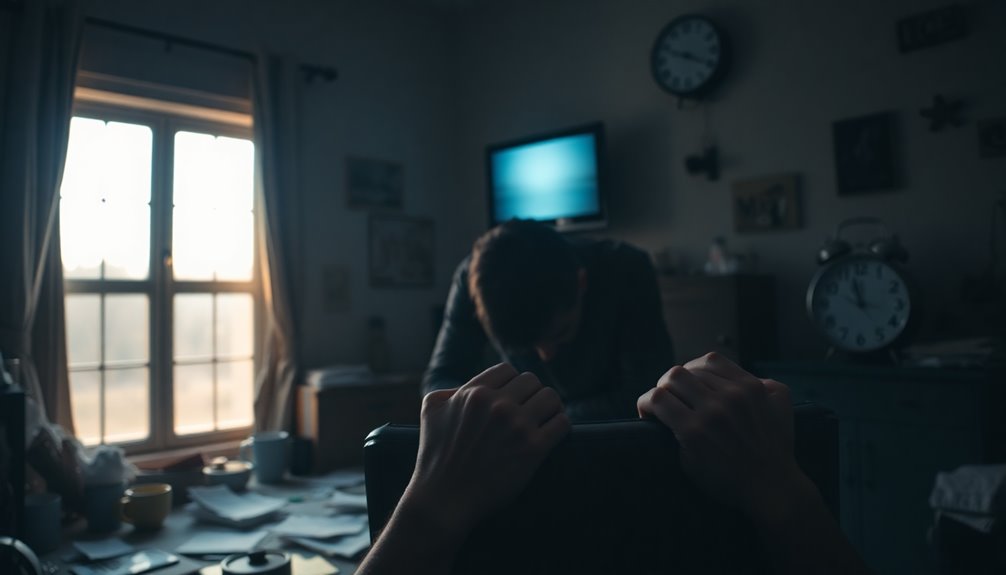
To break free from the grip of porn, you need to develop a personalized strategy that addresses your unique challenges and motivations.
Start by establishing support networks and finding accountability partners who understand your journey. Incorporate self-reflection techniques and mindfulness practices to identify triggers and stay grounded.
Use goal setting to establish clear, achievable milestones, and embrace journaling for its benefits in tracking your thoughts and feelings.
Implement distraction strategies to redirect your focus when cravings arise. Reinforce your commitment with positive affirmations, reminding yourself of your worth.
As you make lifestyle changes, celebrate small victories and rewarding progress, which will help solidify your resolve.
Seeking Professional Help
While some may find success through self-help strategies, seeking professional help can provide the guidance and support necessary for deeper healing.
Professionals offer valuable therapy options tailored to your needs, helping you navigate your journey toward recovery. Consider exploring:
- Addiction counseling for personalized support
- Cognitive behavior therapy to change thought patterns
- Motivational interviewing to boost your commitment
- Support groups for shared experiences and encouragement
- Relapse prevention strategies for long-term success
Utilizing these recovery resources can foster personal growth and establish accountability partners who keep you focused.
Embracing a Healthier Lifestyle

Embracing a healthier lifestyle can greatly impact your journey to overcome porn addiction. By adopting mindful living, you can enhance your awareness of triggers and cravings.
Incorporating balanced nutrition fuels your body and mind, while regular physical fitness releases endorphins, boosting your mood.
Prioritizing stress management through self-care practices helps you cope with daily challenges. Surrounding yourself with positive relationships nurtures emotional resilience and provides support.
Engaging in healthy hobbies not only distracts you from cravings but also fosters personal growth. These lifestyle changes create a solid foundation for lasting recovery.
As you commit to this healthier path, you'll find greater clarity and strength to face challenges head-on, ultimately leading to freedom from porn and a more fulfilling life.
Conclusion
Breaking free from pornography isn't just about willpower; it's a journey of self-discovery and resilience. By understanding your triggers and addressing the underlying stressors in your life, you can rewrite your story. Think of it as untangling a web—each thread you pull can lead you closer to freedom. Embrace healthier habits and don't hesitate to seek help when you need it. You have the strength to reclaim your life and find joy beyond the screen.
